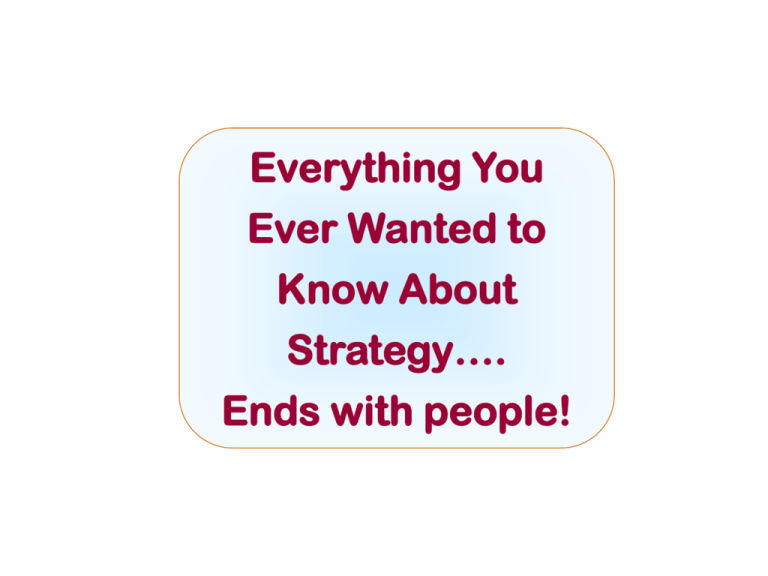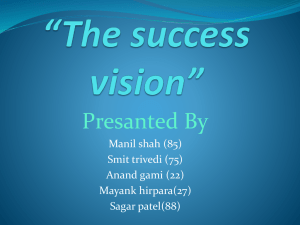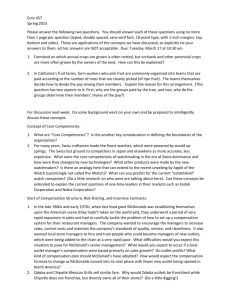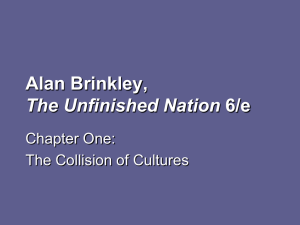
Everything You
Ever Wanted to
Know About
Strategy….
Ends with people!
McGraw-Hill/Irwin
Copyright © 2008 by The McGraw-Hill Companies, Inc. All rights reserved.
“If you want people
motivated to do a good
job, give them a
good job to do.”
Frederick Herzberg
Google 2007
Google 2008
Creating a Strong Fit
Between Strategy and Culture
Responsibility of Strategy Maker –
Select a strategy compatible with the
sacred or unchangeable parts of
organization’s prevailing corporate culture
Responsibility of Strategy Implementer –
Once strategy is chosen, change
whatever facets of the corporate
culture hinder effective execution
Types of Corporate Cultures
Strong vs. Weak Cultures
Unhealthy Cultures
High-Performance Cultures
Adaptive Cultures
Lewin’s Change Model
• Unfreezing
– Creates the motivation to change
• Benchmarking Data
• Financial data, emerging trends
Changing
– Provides new information, new behavioral
models, or new ways of looking at things
Refreezing
– Helps employees integrate the changed behavior
or attitude into their normal way of doing things
A Systems Model of Change
Target Elements of Change
Organizing
Arrangements
Inputs
Outputs
Internal
Internal
Strengths
Strategy
Goals
People
Factors
Weaknesses
Organizational
level
Department/
group level
External
Opportunities
Threats
Social
Individual level
Methods
Leading Change: Why
Transformation Efforts Fail
Kotter, Harvard Business Review, Jan.
2007
Leading Change
1.
2.
3.
4.
5.
6.
7.
Establish a sense of urgency
Create a powerful guiding coalition
Create a vision
Communicate the vision
Empower others to act on the vision
Plan and create short term wins
Consolidate improvements and produce still
more change
8. Institutionalize the approach
Examples: Motivational Practices
Google
Employees are provided with free food,
unlimited ice cream, pool and Ping-Pong tables, and
complimentary massages. Employees are allowed to spend 20%
of their work time on any outside activity.
Lincoln Electric
Rewards productivity by paying for each piece
produced (defects can be traced to worker causing them).
Highest rated workers receive bonuses of as much
110% of their piecework compensation.
Examples: Motivational Practices
JM Family Enterprises
Benefits for employees include: a great lease on new Toyotas, cruises in
the Bahamas on the 172-foot company yacht, office facility has a heated
lap pool, a fitness center, and a free nail salon, and professionally made
take-home dinners.
Xilinx
New hires receive stock option grants.
CEO responds promptly to employee e-mails.
During hard times management takes a 20%
pay cut instead of laying off employees.
Examples: Motivational Practices
Amazon.com
Hands out Just Do It awards to employees who
do something they think will help Amazon without
getting their boss’s permission; the action has to be
well thought through but doesn’t have to succeed.
Nordstrom
Pay salespeople higher than prevailing rates,
plus commission. “Rule #1: Use good judgment in
all situations. There will be no additional rules.”
Examples: Motivational Practices
W. L. Gore
Employees get to choose what project/team they work on; each
team member’s compensation is based on other team members’
ranking of his/her contribution to the enterprise.
Amgen
Employees get 16 paid holidays, generous
vacation time, tuition reimbursements up to $10,000,
on-site massages, a discounted car wash, and the convenience
of shopping at on-site farmers’ markets.
Key Considerations in
Designing Reward Systems
•
•
•
•
•
Create a results-oriented system
Reward people for results, not for activity
Define jobs in terms of what to achieve
Incorporate several performance measures
Tie incentive compensation to relevant outcomes
– Top executives – Incentives tied to
overall firm performance
– Department heads, teams, and
individuals – Incentives tied to
achieving performance targets
in their areas of responsibility
Guidelines for Designing an
Effective Compensation System
1. Payoff must be a major, not
minor, piece of total
compensation package
2. Incentive plan should
extend to all employees
3. Administer system with
scrupulous fairness
4. Link incentives to achieving
only the performance
targets in strategic plan
5. Targets a person is expected
to achieve must involve
outcomes that can be
personally affected
6. Keep time between
performance review
and payment short
7. Make liberal use of
non-monetary rewards
8. Avoid ways of rewarding
non-performers
Building an
Organization
Capable of Good
Strategy Execution
McGraw-Hill/Irwin
Copyright © 2008 by The McGraw-Hill Companies, Inc. All rights reserved.
Crafting vs. Executing Strategy
Crafting the Strategy
• Primarily a market-driven
activity
• Successful strategy making
depends on
– Business vision
– Perceptive analysis of
market conditions and
company capabilities
– Attracting and pleasing
customers
– Outcompeting rivals
– Using company capabilities
to forge a competitive
advantage
Executing the Strategy
• Primarily an operations-driven
activity
• Successful strategy execution
depends on
– Doing a good job of working
through others
– Good organization-building
– Building competitive
capabilities
– Creating a strategysupportive culture
– Getting things done and
delivering good results
Implementing a New Strategy
Requires Adept Leadership
• Implementing a new strategy
takes adept leadership to
– Convincingly communicate
reasons for the new strategy
– Overcome pockets of doubt
– Secure commitment of concerned parties
– Build consensus and enthusiasm
– Get all implementation pieces in place and coordinated
Goals of the Strategy
Implementing-Executing Process
• Unite total organization behind strategy
• See that activities are done in a manner that is
conducive to first-rate strategy execution
• Generate commitment so an enthusiastic
crusade emerges to carry out strategy
• Fit how organization conducts its
operations to strategy requirements
What Top Executives Have to Do in
Leading the Implementation Process
• Communicate the case for change
• Build consensus on how to proceed
• Arouse enthusiasm for the strategy to turn implementation
process into a companywide crusade
• Empower subordinates to keep process moving
• Establish measures of progress and deadlines
• Reward those who achieve
implementation milestones
• Direct resources to the right places
• Personally lead strategic change process
and the drive for operating excellence
Fig. 11.2: The Three Components of Building an
Organization Capable of Proficient Strategy Execution
Example: Intel’s Core Competence
Design and mass production
of complex chips
for personal computers
Example: Procter & Gamble’s
Core Competencies
Superb marketing-distribution skills and R&D
capabilities in five core technologies - fats, oils, skin
chemistry, surfactants, emulsifiers
Example: General Electric’s
Core Competencies
Developing professional managers with broad
problem-solving skills and
proven ability to grow
global businesses
Example: Disney’s Core
Competencies
Theme park operation and family
entertainment
Example: Dell’s Core Competencies
Capabilities to deliver state-of-the-art products to
customers within days of next-generation
components coming available and at attractively low
costs
Example: Toyota’s Core Competence
Legendary “production system” giving it the
capability to produce high-quality vehicles at
relatively low costs
Organizational Structures of
the Future: Overall Themes
• Revolutionary changes in how work is organized have
been triggered by
– New strategic priorities
– Rapidly shifting competitive conditions
• Tools of organizational design include
–
–
–
–
Empowered managers and workers
Reengineered work processes
Self-directed work teams
Rapid incorporation of Internet
technology
– Networking with outsiders
The future
structure
will be . . .
Characteristics of
Organizations of the Future
• Extensive use of Internet technology
and e-commerce business practices
• Fewer barriers between
–
–
–
–
Different vertical ranks
Functions and disciplines
Units in different geographic locations
Company and its suppliers, distributors,
strategic allies, and customers
Change &
Learning
• Capacity for change and rapid learning
• Collaborative efforts among people in different
functions and geographic locations
Good Luck!








